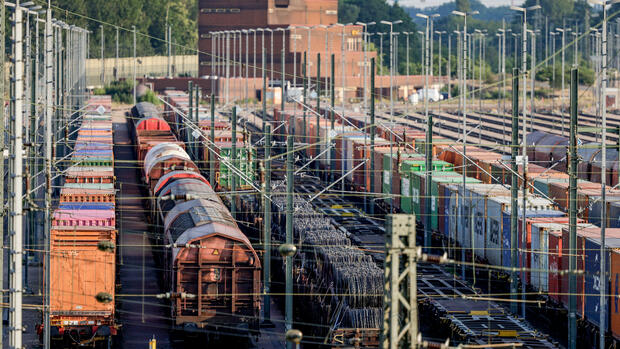The prospects for companies are worse than expected.
(Photo: dpa)
Berlin Sentiment among German and European companies deteriorated in July – and more than expected. This is shown by the current data from the purchasing managers’ indices, which the financial services provider S&P Global publishes monthly. The indices are considered an early warning signal for economic development.
The index for the entire German private sector – industry and service providers together – fell by 2.3 to 48.3 points in July. This is not only the third decline in a row, but also the worst reading in eight months.
Economists surveyed by the Reuters news agency had only expected a drop to 50.3 points. For the first time since January, the barometer is below the threshold of 50 points, from which it signals growth.
“This is a bad start to the third quarter for the German economy,” said chief economist Cyrus de la Rubia of Hamburg Commercial Bank (HCOB), which sponsors the survey. “The probability that the economy will be in recession in the second half of the year has increased.” In late 2022 and early 2023, Europe’s largest economy shrank for two consecutive quarters and has been in a so-called technical recession ever since.
The index for the private sector in the euro zone fell by 1.0 to 48.9 points. This is the second decline and consequence and the worst value since November 2022. Economists surveyed by the Reuters news agency had only expected a slight decline to 49.7 points.
Expert expects continued recession
“The euro zone economy is likely to contract further in the coming months as the service sector loses momentum,” said de la Rubia. The barometer for the service sector fell by 0.9 to 51.1 points, the lowest level in six months. For the first time since the turn of the year, new business has shrunk, as has the order backlog.
It looks even bleaker in the industry. Here the barometer fell by 0.7 to 42.7 points. This is the worst value in more than three years. “Manufacturing remains the eurozone’s Achilles’ heel,” said de la Rubia. “Manufacturers again scaled back production at an accelerated pace in July.”
At the same time, the pressure on prices eased further: companies increased their average sales prices more slowly than they had in almost two and a half years. In the industry, prices have been reduced because of falling demand, the most since the peak of the global financial crisis in 2009, it said. They are still increasing among service providers, but more slowly than at any time in the last 21 months.
More: The next economic slump is on the horizon
